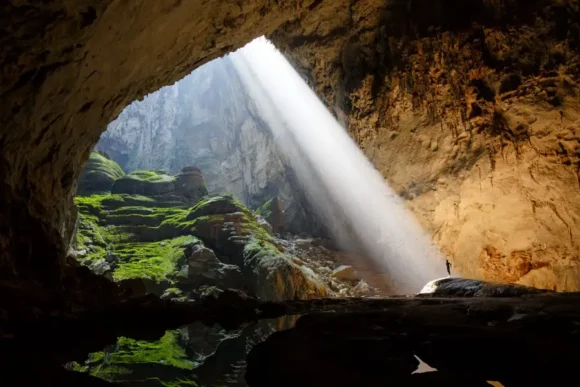Watching Alastair Evans’s A Crack in the Mountain for New Scientist, 17 May 2023
“Everyone on a bicycle wants to be on a motorbike. Everyone on a motorbike wants to be in a car. And everyone in a car wants to be in a helicopter.” A wry smiles creeps across the face of local business owner David “multi” English: “So off we go to the future.”
Ten years ago Phong Nha in Quang Binh province was arguably the poorest region in Vietnam. English arrived during the 2010 floods and remembers the region’s air of despondency. People fished the rivers and grew a little rice. Hunger was commonplace.
But the arrival of British caving expedition the previous April already signalled a big change. They had arrived to explore a cave system known to local farmers since 1991 but very remote, and up until then, entirely ignored.
Following a 5 kilometre-long fault through limestone, they discovered chambers that could each quite happily contain an entire city block. In places the ceilings are 200 metres high. Here and there, where the roof has fallen in, there are sunken forests boasting unique species of tree fern and other plants.
With its two jungles, two rivers and a waterfall, Hang So Doong is not just the largest dry cave in the world; “it doesn’t feel like you’re on planet Earth any more.” So says Meredith Harvey, who visited the cave in 2017.
Now the local government wants to put a cable-car through the site, opening it up to 1000 tourists per hour. Conversations with UNESCO have won a reprieve to 2030, but no-one seriously believes the site will remain pristine forever. Jonathan Drake, who visited in 2019, puts it this way: “Just imagine if the Grand Canyon was just discovered this week and it didn’t belong to anyone… how would that go?”
Alastair Evans’s documentary tells a story we have heard before, many times. In 1968 biologist Garrett Hardin coined the expression “tragedy of the commons” to describe a situation in which individuals use a shared resource in their own self-interest, leading to its eventual depletion. Will this happen to So Doong?
Certainly. It’s impossible to imagine the rulers of an Asian Tiger economy simply writing off their most potentially lucrative natural wonder, just so that a handful of wealthy foreign tourists can continue to enjoy its untouched charm.
It is not unreasonable to want an adventure. It is not unreasonable to make the most of one’s birthplace. It is not that unreasonable, after a lifetime riding to work on a motorbike, to want your children to be able to afford a car. This is what makes the tragedy of the commons a actual tragedy.
Of course, it is still possible to watch A Crack in the Mountain simply for its beauty, and for this, some credit must go to the local expeditions company Oxalis Adventure, founded by businessman Chau A Nguyen to put considerable sums (enough to buy schools, anyway) back into the local economy. The production values on show here are extraordinarily high. The expeditions through the cave appear very well managed. One might wish that Nguyen and his kind could simply be left alone to tailor the region’s development according to the needs of local people.
But then, that’s to forget the ravages of Covid-19, that closed down 90 per cent of Phong Nha’s small businesses, not to mention a series of recent floods that brought what little activity that remained in the region to a standstill. Big government, big finance and big engineering can weather such storms — but their activities come at a price.
This is a film about a wicked problem, sure to despoil a wonderful location, if not today then tomorrow, or the next day, or the day after that. By then, if a way to square this impossible equation ever does present itself, it will surely have been inspired by films as intelligent and passionate as this one.

